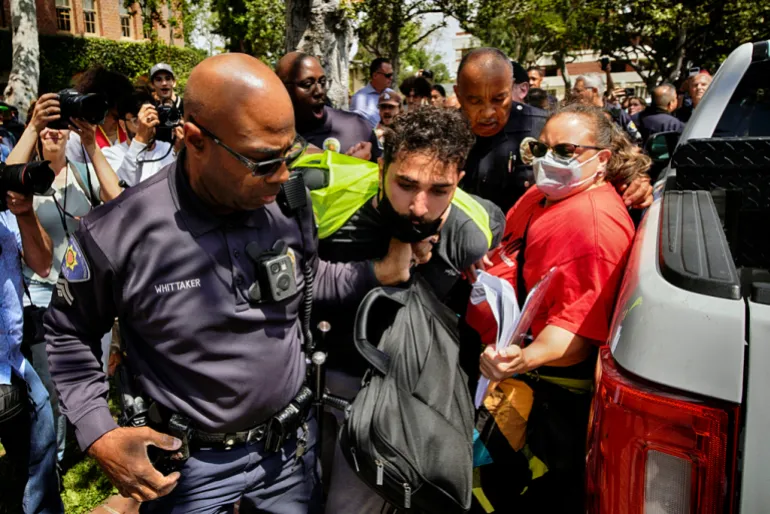In recent days, campuses across the United States have become battlegrounds not just for education, but for the fundamental right to protest and express solidarity.
In what could be described as a glaring expression of dissent to the ongoing Israel-Hamas war and U.S’ support for Israel, student-led protests against Israel’s war on Gaza have intensified across the United States.
The essence of university life lies in the exchange of ideas, the pursuit of knowledge, and the courage to stand up for one’s beliefs. Yet, as students peacefully demonstrate in solidarity with Palestinians in Gaza, they are met with riot gear, batons and arrests.
Police in riot gear arrested dozens of young people at the University of Texas at Austin (UT Austin) and the University of Southern California (USC).
The arrests in Austin and Los Angeles came as students at Harvard University and Brown University on the east coast of the US also defied threats of action and set up encampments in solidarity with Palestinians in Gaza.

The student movement, which began at Columbia University in New York last week, is demanding that universities cut financial ties to Israel and divest from companies they say are enabling its months-long war in Gaza.
The protests have been largely respectful and peaceful, but have been met by heavy-handed action from many universities amid claims of anti-Semitism.
The largest protest took place at UT Austin where hundreds of students staged a walkout and marched to the campus’s main lawn, where they planned to set up an encampment.
The university said that it would “not tolerate disruptions” and called in local and state police to disperse the crowds.
The Texas Department of Public Safety disclosed that at least 34 people were taken into custody. At least 50 more were detained by police at University of Southern California (USC).
Greg Abbott, the Republican Governor of Texas, said that the protesters “belong in jail” adding that any students joining in what he called “hate-filled, anti-Semitic protests” should be expelled.
U.S House Speaker, Mike Johnson, jumped into the fray with a visit to Columbia University in New York.
Johnson denounced the demonstrations as “mob rule” and condemned what he called a “virus of antisemitism” at colleges nationwide.
“And it’s detestable, as Columbia has allowed these lawless agitators and radicals to take over. If this is not contained quickly and if these threats and intimidation are not stopped, there is an appropriate time for the national guard.”
Mike Johnson
He also called for the resignation of Columbia’s President, who he accused of failing to protect Jewish students and allowing protests that led to the arrest of dozens of people there last week.
Labeling these protests as anti-Semitic only serves to deflect from the real issues at hand.
Criticizing the policies of a government, be it Israel or any other, is not synonymous with hatred toward a particular religious or ethnic group. It is a form of political dissent, protected by the same principles that underpin free speech.
The actions of police at UT Austin and USC send a chilling message that peaceful protest will not be tolerated and that dissenting voices will be silenced by force if necessary.
This is antithetical to the values of democracy and academic freedom. Instead of fostering an environment where students feel empowered to engage in critical dialogue and activism, these actions breed fear and intimidation.
Nothing Anti-Semitic
Jeremi Suri, who is Jewish and a Professor of history at UT Austin, told a news agency that there was “nothing anti-Semitic” about the protests.
“These students were shouting ‘free Palestine’, that’s all,” he said.
“They were saying nothing that was threatening. And as they were standing and shouting, I witnessed the police – the state police, the campus police, the city police – an army of police almost the size as the student group … many were carrying guns, many were carrying rifles, and then, within a few minutes, this group of police stormed into the student crowd and started arresting students.”
Jeremi Suri
Jody Armour, a law professor at the USC, also opined that claims of anti-Semitism were being used to try and silence the protests.
“We have lots of Jewish, and Muslim, and Palestinian, and Catholic like I am, Protestants too, intergenerational, coming together. Everybody should hate anti-Semitism and fight anti-Semitism, but being opposed to Israel’s slaughter in Gaza that the UN has said may plausibly be genocide, does not mean that you’re anti-Semitic, and we need to stop allowing people to weaponise anti-Semitism against real valid protests.”
Jody Armour
Faculty at UT Austin will be striking in response to what they called a “militarized response” to a “peaceful, planned action,” stating on X that they are refusing to hold classes starting Thursday, April 25, 2024.
It must be remembered that the right to protest is a cornerstone of democracy. It is through peaceful assembly and advocacy that positive change is often achieved.
By suppressing student protests, universities not only betray their commitment to free speech but also perpetuate the very injustices that students are speaking out against.
University administrations should listen to their students, engage in meaningful dialogue and uphold the principles of free speech and social justice.
The silencing of dissenting voices only serves to perpetuate oppression and stifle progress.






















